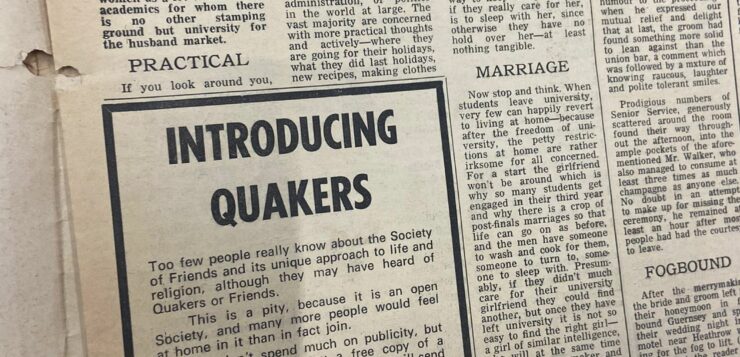Wessex Scene was founded way back in 1936 (where it was known as Wessex News) – a year which today very few live to tell the tale. However, it is safe to say that since then, a lot has happened and a lot has changed. Wessex Scene even outdates the university itself, which gained its official status in 1952. Thankfully, many editions of Wessex News/Scene have been archived, so we can understand the diverse experiences and opinions surrounding the university over the years from the eyes of past and present students. This article will trace the opinions of those who have tread the same steps that we are taking now, and how they may be both outrageously different or strangely similar.
To put the long history of Wessex Scene into perspective, here are a few stats:
- Hartley library was formed just a year prior (1935), but since then it has developed an archive of 3 million books, journals and reports.
- Britain has seen 18 Prime Ministers (they’ve been coming thick and fast recently!)
- Not to mention some other pretty major events as well: WW2 (1939-45), Civil Rights Act in America (1964), First Moon Landing (1969), Fall of the Berlin Wall (1989), Foundation of Amazon (1994), 9/11 Attacks (2001), First iPhone launched (2007), Brexit (2016), The Invasion of Ukraine (2022), to name a few.
Now that we fully understand how long students have decided to document life at the University, lets look at how things have changed over the years.
What society considers appropriate is a particularly hot topic at the moment, and societal norms are changing by the day. With the constant adaptions in ‘political correctness’, someone from 1936 would simply not be able to understand nor fit into the world we live in today. However, whilst trawling through some old editions, this is certainly for the better.
Our society nowadays strives to uphold standards of inclusivity and equality – however it still has a long way to go in its objective. Despite this, when looking at the commonplace of derogatory terms and misogyny in older editions of Wessex Scene, it’s clear some progress has been made.
Stories titled such as Unbend Your Bird, and Does Your Girlfriend Strain You? from the late 60s/early 70s speak for themselves. This quote stood out to me – “Do you see university women as a lot of frustrated academics for whom there is no other stamping ground but university for the husband market. If you look around you, you will see very few women who are real academics”
In organisations such as universities, which have traditionally been gatekept to wealthy men, it is no surprise to run into such articles. It explains why there have been so many barriers to gender equality. This categorisation, generalisation, and discrimination is used casually here, showing the seriousness equality was given in this not so distant time.
If any articles of this nature were written today, the majority of publishers wouldn’t let this get past the editorial team. However, big names such as The Sun have shown lapses in this ‘safety net’, allowing Jeremy Clarkson to publish a discriminative article on Meghan Markle. This article has subsequently been branded as sexist by the press regulator, and attracted more than 25,000 complaints – there is hope! Although there is stark change to the lax moral justification of 1936, it is likely that 87 years down the line people will be writing the same thing about the society we find ourselves navigating today.
Aside from changes in what is written, the medium through which Wessex Scene is read would be unrecognisable to the reader in 1936. As your fingers glide across the glossy, colourful and illustrated pages of this copy, imagine a big paper broadsheet, simply with just columns of words. This is not to forget that most of you are probably reading this online. Throughout the history of Wessex scene, the computer has made leaps and bounds. Something that used to be the size of a large room now fits in your hand. Although people may have expected flying cars by now (the producers of Back to the Future certainly did), this would still be completely out of the realms of conception for your average reader in 1936.
Having said this, some of the opinions that previous students have expressed are remarkably similar.
I’d like to share a section of a poem about exams that I read in the June 16th 1936 edition of Wessex News:
What use to curse those wasted hours,
When all this nice blank paper’s ours?
Before us all our future lies,
With job or dip – think not with sighs upon the pass list’s narrow doors
By Hardt-Veldt
Although nowadays it may be a turn-it-in link as opposed to blank paper and an ink pot, the student opinion on exams/assignments has not changed in the slightest.
A quote from the March 16th 1937 edition sums up how all of us feel right now with the Christmas holidays around the corner – “At the end of term we are on the eve of that necessary breathing-space in the academic year“.
I’d like to finish with this quote on the one year anniversary of Wessex scene. Editor-in-chief at the time J. F. Gravett writes “it has kept its head above the water for over a year, and still shows no sign of going under.” I’d like to think they’d be proud, reading Wessex Scene 87 years later, showing no signs of going under, and displaying the power, importance, and continuity of journalism.




